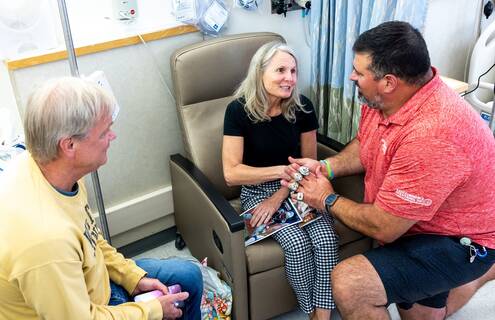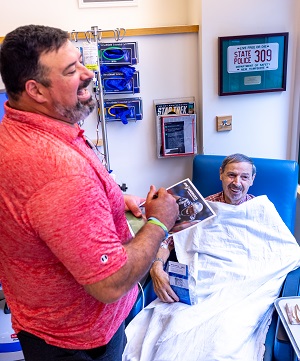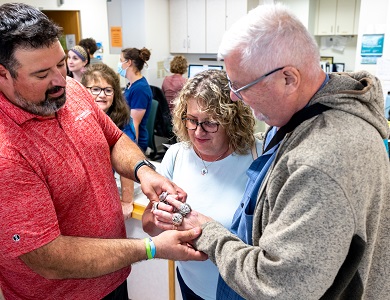
No one saves for cancer.
Joe Andruzzi, former New England Patriot and foundation co-founder“No one saves for cancer.” With that simple statement, former New England Patriot, Super Bowl Champion and cancer survivor Joe Andruzzi explains the financial challenge facing many cancer patients.
The National Cancer Institute reports that cancer patients are at the highest risk of financial toxicity – the negative impact of treatment on ability to pay household bills. As treatment keeps them and caregivers out of work, housing, utility, fuel and food bills continue to pile up.
Andruzzi and his wife Jen had a front-row view of the physical and emotional toll taken by financial toxicity. They saw it in their philanthropic work with pediatric brain cancer patients and their families. They heard about it from fellow patients as Andruzzi underwent treatment for non-Hodgkin’s Burkitt’s lymphoma.
Giving back
In 2008, the Andruzzis established the Joe Andruzzi Foundation (JAF). “To date, we have provided over $10 million in grants to support more than 40,000 patients and their family members throughout New England,” says Danielle Fish, vice president of JAF. “Our goal is to help and bring hope to patients of any age, in active treatment for any type of cancer.”

In the past 5 years, JAF has provided $300,000 to 400 Dartmouth Cancer Center patients. To celebrate that relationship and its 15th anniversary, JAF kicked off a road trip with a visit to the Norris Cotton Cancer Care Pavilion at Dartmouth Cancer Center in Lebanon on September 13th.
“The visit was a great chance for us to meet with patients and reconnect with the nurses and social workers who help us support them,” says Fish. “Joe knows what it’s like to undergo cancer treatment and enjoys visiting with patients and sharing his Super Bowl rings. Our staff was also eager to meet with Cancer Center staff. We wanted to thank them for their efforts and get ideas for making our processes even better.”
Social work connections
Patients in need of non-medical financial support are referred to JAF by social workers. “We fill out all the paperwork, compile the necessary documents and outline the need,” says Continuing Care Manager Catherine Reed. Eligible recipients can receive up to $800 annually. Grocery cards for five major chains are available in amounts based on family size.
“Our nurses and social workers get to know their patients well,” says the Cancer Center’s Senior Director of Nursing Operations Miriam Dowling-Schmitt. “It’s so frustrating to learn that a patient is worried about affording transportation to and from treatment or rent or firewood. JAF gives our staff a way to say, ‘We can help’.”

Reed now refers to JAF as her steadfast, reliable, ‘go-to’ for grants that have a meaningful impact. “A JAF grant allowed a patient to get a tooth extracted so that he could receive a life-saving stem cell transplant,” she recalls. “Another helped pay property taxes for a lymphoma patient. And, when a liver cancer patient said, ‘I will have to work until the day I die,’ a JAF grant helped cover his car expenses.”
“Reducing financial toxicity is part of Dartmouth Cancer Center’s annual strategic goal,” says Frank Panzarella, vice president of Oncology Services. “We want to help patients meet financial challenges so they can focus on healing. We want to relieve the helplessness nurses and social workers feel when they can’t help the patients in their care. JAF is an important partner in that goal.”